Exton Surname Ancestry ResultsOur indexes 1000-1999 include entries for the spelling 'exton'. In the period you have requested, we have the following 207 records (displaying 11 to 20): Single Surname Subscription | | | Buying all 207 results of this search individually would cost £1,150.00. But you can have free access to all 207 records for a year, to view, to save and print, for £100. Save £1,050.00. More... |
These sample scans are from the original record. You will get scans of the full pages or articles where the surname you searched for has been found. Your web browser may prevent the sample windows from opening; in this case please change your browser settings to allow pop-up windows from this site. Landowners and tenants in Essex
(1345-1485)
Inquisitions ad quod damnum were held by the appropriate sheriff or escheator (or other officer in whose bailiwick the matter in question might lie) to investigate cases in which the royal or public interest might be damaged by proposed alienation or settlement of land (especially alienation to religious uses, into mortmain). The key findings from these inquisitions were as to the tenure of the land and the service due from it; its yearly value; the lands remaining to the grantor, and whether they sufficed to discharge all duties and customs due from him; and whether he can still be put upon juries, assizes and recognitions, so that the country be not burdened by his withdrawal from them. Generally speaking, this process had the makings of a system of licensing such alienations, and raising money in proportion to the valuations. Equally, there are many items that deal with subjects such as the closing of public roads, the felling or inclosing of woods, or the proposed grant of liberties or immunities. A calendar of these inquisitions from the 19th year of the reign of king Edward III to the 2nd year of Richard III was prepared by the Public Record Office and published in 1906. We have now indexed this calendar by surname and county. Most of the individuals appearing in the calendar are either pious individuals seeking to make grants to religious bodies for the sake of their souls; or landowners securing the disposition and settling of their real estate. But some other names do appear - tenants, trustees, chaplains and clerks.EXTON. Cost: £6.00.  | Sample scan, click to enlarge
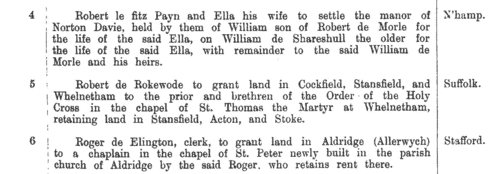
| Taxpayers in Sussex
(1524-1525)
By Act of Parliament of 1523 (14 & 15 Hen. III, c. 16) a general subsidy was raised, spread over four years, from laymen, clergy and peers. In each of the first two years 1s in the £ was raised from annual income from land; 1s in the £ on capital goods worth over £2 and under £20; and a flat payment of 4d on goods worth from £1 to £2, and also by persons aged 16 and upwards in receipt of £1 per annum in wages. In the third year a further shilling in the pound was payable on land worth £50 and upwards a year; and in the fourth year a shilling in the pound on goods worth £50 and upwards. To raise this revenue, returns were required from every hundred, parish or township. In Sussex, the returns for 1524 and 1525 cover the city of Chichester (divided into Estrata, Westrata, Southstrata, North[strata] and Palenta), the borough of Midhurst, and then the rest of the county divided into rapes, within those into hundreds, and within those into boroughs, tithings, liberties, townships or parishes. It is important to note that the cinque ports of Hastings, Rye and Winchelsea were exempt from the subsidy, except for alien inhabitants; and that the town of Westbourne was also exempted 'as the town was lately destroyed by fire'. Aliens are noted as such, sometimes with nationality; and Brighthelmstone (Brighton), which had been burnt by the French in 1514, is only represented fragmentarily. The Sussex Record Society published this transcript and edition by Julian Cornwall of the 1524 and 1525 returns: the 1524 return was used for the main transcript where possible, names peculiar to the 1524 lists being marked with an asterisk, and those with amendments in 1524 with a dagger. At the foot of each 1524 return the new names from 1525 are given. Only the amount of the assessment is printed (m. = marks). Letters prefixed to the sum give the basis of the assessment, no letter (or G) meaning that it was on goods - A, annual wages; D, annual wages of day-labourers; F, fees or salaries of office; L, lands; P, profits; W, wages; x, no basis stated. EXTON. Cost: £4.00.  | Sample scan, click to enlarge

| Militia in Taunton hundred, Somerset
(1569)
A muster of the ablemen, gunners, light horsemen, pikemen, archers and billmen available from this hundred, compiled by sir Hugh Paulet, sir Maurice Barkeley, sir Ralph Hopton and John Horner in answer to a royal commission of the 11th year of queen Elizabeth. The returns are arranged by tithing. The hundred consisted of the parishes of Angersleigh, Bishops Hull, Bradford on Tone, Cheddon Fitzpaine, Combe Florey, Corfe, Cothelstone, Heathfield, Hillfarrance, Kingston St Mary, Lydeard St Lawrence, Norton Fitzwarren, Nynehead, Oake, Orchard Portman, Otterford, Pitminster, Rimpton, Ruishton, Staplegrove, Stoke St Mary, (the borough of) Taunton, Tolland, Trull, West Bagborough, Wilton and Withiel Flory. (The sample shown is from the return for the borough of Axbridge)EXTON. Cost: £6.00.  | Sample scan, click to enlarge
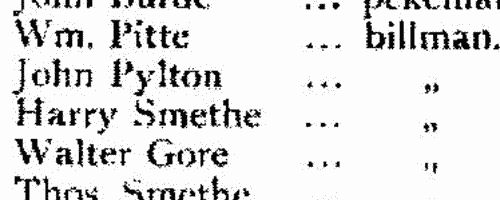
| Cecil Manuscripts
(1590-1594)
Letters and papers of William Cecil lord Burghley, Lord Treasurer of England.EXTON. Cost: £4.00.  | Sample scan, click to enlarge
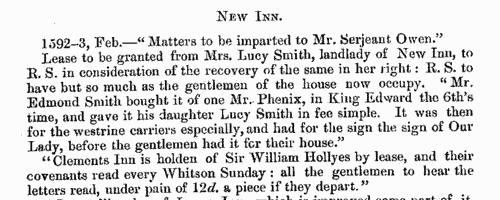
| Middlesex Sessions
(1549-1603)
This printed calendar collates a number of surviving records from Middlesex sessions for the period. Principally these are the Gaol Delivery Rolls (G. D. R.) and the General Sessions of the Peace Rolls (G. S. O. P. R.). Both series cover general criminal indictments (bills) together with the recognizances of the witnesses to attend; but the Gaol Delivery Rolls, by their very nature, tend to deal with the more serious cases - felonies where the accused could not be released on bail. The General Sessions rolls also include the sheriff's lists of bailiffs, sub-bailiffs, high and petty constables in the shire; writs of venire facias for production of jurors, writs of capias, lists of jurors, jury-panels &c. The Gaol Delivery Rolls also include coroners' inquests, writs of supersedeas, and memoranda of proclamations. Special inquiries are recorded in separate Sessions of Oyer and Terminer (S. O. T.) rolls and Inquest or Inquisition rolls (I. R.) Although coverage is good, none of the sequences of rolls for this period is complete. A peculiarity of this calendar is that in the case of actual incidents, the date given at the start of each entry is the date that the incident was alleged to have taken place (for instance, 1 June 11 Elizabeth (1569) in the sample scan) rather than the date of the court proceedings. EXTON. Cost: £4.00.  | Sample scan, click to enlarge

| London Marriage Allegations
(1521-1610)
London, Essex and part of Hertfordshire lay within the diocese of London. In the later 17th century the individual archdeaconry courts issued marriage licences, but for this period the only surviving material is from the overarching London Consistory court. The main series of marriage allegations from the consistory court starts 7 December 1597, and these were extracted by Colonel Joseph Lemuel Chester; Colonel Chester then discovered earlier material, back to 5 January 1521, in Vicar-General's Books of the Principal Probate Registry. The notices in these books were much briefer, but as well as extending back so much earlier, they included additional material for 1597 onwards. All this he collated with the consistory court extracts, and the text was edited by George J. Armytage and published by the Harleian Society in 1887. A typical later entry will give date; name, address and occupation of groom; name, address and condition of his intended bride, and/or, where she is a spinster, her father's name, address and occupation. Lastly we have the name of the church where the wedding was going to take place; or the words Gen. Lic. signifying a general or open licence.EXTON. Cost: £4.00.  | Sample scan, click to enlarge

| Lancashire and Cheshire Marriage Licences
(1606-1616)
Licences for intended marriages in Chester archdeaconry, which covered Cheshire and Lancashire south of the Ribble (by far the most populous part of that county)EXTON. Cost: £4.00.  | Sample scan, click to enlarge

| Inhabitants of Somerset
(1607-1625)
The Reverend E. H. Bates prepared extracts from the Somerset quarter session records of 1607 to 1625 for publication by the Somerset Record Society (xxiii) in 1907. The period is covered by quarter sessions minute book 1 (1613 to 1620) and part of book 2 (1620-1627); these are based on the rolls of recognizances (taken, discharged and forfeited); criminal indictments (not touched on in Bates's extracts); and sessions rolls 1 to 16 (abstracted by A. J. Monday). The records covered and illustrated by these extracts are introduced under the heads Sessions Business; Relief of the Poor; Apprentices, Bastards and Lunatics; Charities (Alms- and Pest-Houses); Housing the Poor; Roads and Bridges; Rates and Appeals; Houses of Correction; and Drink Traffic. EXTON. Cost: £4.00.  | Sample scan, click to enlarge
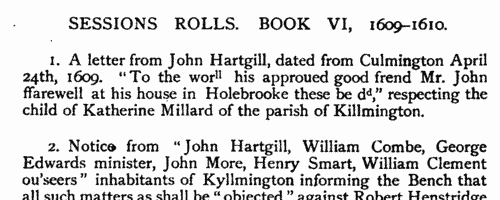
| PCC Probate Abstracts
(1630-1634)
The Prerogative Court of Canterbury's main jurisdiction was central and southern England and Wales, as well as over sailors &c dying abroad: these brief abstracts usually give address, date of probate and name of executor or administrator
EXTON. Cost: £2.00.  | Sample scan, click to enlarge

| PCC Probates and Administrations
(1648)
The Prerogative Court of Canterbury's main jurisdiction was central and southern England and Wales, as well as over sailors &c dying abroad: these brief abstracts, compiled under the title "Year Books of Probates", and printed in 1906, usually give address, date of probate and name of executor or administrator. They are based on the Probate Act Books, cross-checked with the original wills, from which additional details are, occasionally, added. The original spelling of surnames was retained, but christian and place names have been modernised where necessary.EXTON. Cost: £2.00.  | Sample scan, click to enlarge
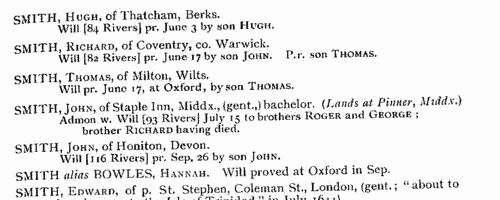
|
Research your ancestry, family history, genealogy and one-name study by direct access to original records and archives indexed by surname.
|












